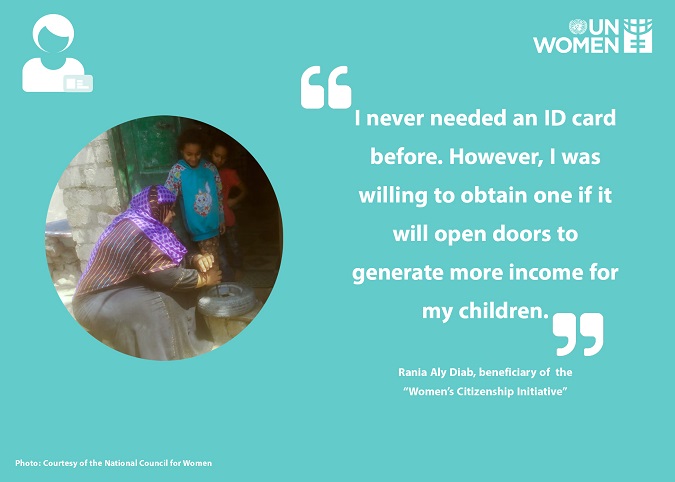ID Cards Opening Doors for Egyptian Women
Date:

Rania Aly Diab, a 27-year-old woman from Kom El-Loufy village in Minya, is standing strong against all the challenges she has faced throughout her life. After getting married off once she finished primary school, Rania soon became a mother. Her husband, who used to run a small workshop on the village highway repairing tires, is now in prison with a seven-year sentence. In the absence of their father, Rania has become the sole financial provider and supporter for her children. She quickly took over her husband’s workshop and started fixing and checking tire pressures for passing customers – a field that is usually dominated by men.
“We used to live off the little income received from patching and adjusting tire pressure, which hardly supported my children and I,” said Rania. Her small family used to also receive some assistance from family and neighbors, who witnessed the difficult situation they were living.
During awareness raising campaigns implemented by rural women leaders, within the framework of the “Women’s Citizenship Initiative”, Rania realized that she never issued an ID card for herself and that it would create better opportunities for the whole family.
“I never needed an ID card before. However, I was willing to obtain one if it will open doors to generate more income for my children,” she stated.
With the guidance of her neighbor, Rania issued her first ID card and started exploring the available services. With the support of the National Council for Women, she applied to and received a small credit loan from the Micro, Small and Medium Enterprises Development Agency (MSMEDA), which operates under the Ministry of Social Solidarity. The loan came in the form of a kiosk that she has placed beside the tires workshop to sell refreshments and snacks.
With her ID card, she was also granted the “Aman El-Masryeen” Certificate (Safety of Egyptians Certificate) for three years. This certificate provides a safety net of life insurance for those who do not have a fixed income.
Besides the increased income, the ID card has also helped Rania improve her children’s quality of life. She was able to register both her elder son, Mostafa, and daughter, Shahd, in school. She was also able to register her youngest son’s birth certificate, ensuring his future rights.
***
The ‘Women’s Citizenship Initiative’, implemented under the leadership of the National Council for Women (NCW) with technical support from UN Women Egypt, works on enhancing women’s political participation and leadership. This initiative aims to raise awareness of the importance of obtaining ID cards and facilitating the process for women, like Rania, to issue theirs. ID cards enable women to access public services, including health and education for them and their children, receive loans, open bank accounts, and vote as well as run as candidates in elections.
Read in Arabic.